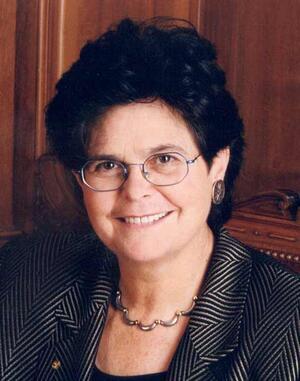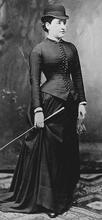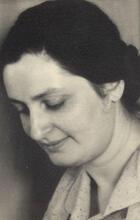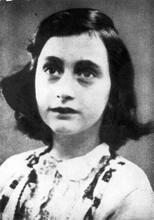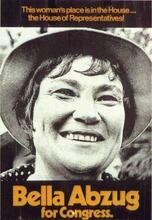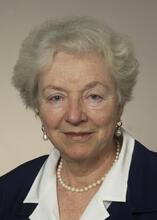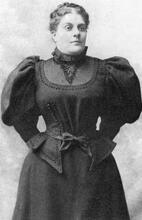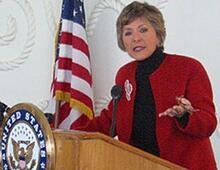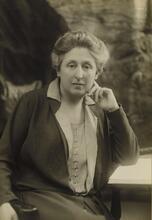Ruth Dreifuss
An outspoken and strong feminist, Ruth Dreifuss was the first woman and the first Jew to hold the office of President of the Swiss Confederation—a significant achievement in Switzerland, where women received the right to vote only in 1971 and which was the last country in Western Europe to recognize Jewish rights.
Institution: Ruth Dreifuss.
Involved in politics as a member of the Social Democratic Party since 1965, Ruth Dreifuss became the first female general-secretary of the Swiss Federation of Trade Unions in 1981. In 1993, she was elected by the Swiss parliament to the Federal Council, serving ten years as Minister for Domestic Affairs, during which she fought successfully for paid maternity leave. She also took an active role in investigating Switzerland’s role during World War II and in discussions between Switzerland, the World Jewish Congress, and American authorities regarding funds of Jewish Holocaust victims held in Swiss bank accounts. In 1997, Dreifuss served as Vice President of the Swiss Federal Council and in 1999 became President of the Swiss Confederation—the first woman and the first Jew to hold this office.
Family, Education, and Early Career
An outspoken and strong feminist, Switzerland’s first Jewish member of the Federal Government and first woman president Ruth Dreifuss was born in St. Gall in Eastern Switzerland on January 9, 1940. The Dreifuss family was among the oldest Jewish families in Switzerland, living for more than three centuries in Endingen (Canton of Aargau), one of the two villages of old Switzerland in which Jews could live before the emancipation in 1866. Her mother’s family left Alsace (near Colmar) after the German annexation in 1871 and Ruth’s mother Jeanne Dreifuss-Bicard (1905–1962) was born in St. Gall,as was her father Sigi Dreifuss (1899-1956). Ruth’s brother, Jean Jacques, born in 1936, was a professor of physiology in the faculty of medicine at the University of Geneva.
The uncertainties of living so close to the border with Nazi Germany, combined with the loss of professional opportunities in World War II, led the family to move to Bern in 1942. After the war, the family established itself in Geneva, where Dreifuss finished school with a commercial diploma in 1958. She began her working life as a hotel secretary in Ticino. After studying social work, she served as a deputy editor of Coopération, the weekly publication of the Swiss Union of Cooperatives, the biggest consumer cooperative in Switzerland. She studied economics and econometrics at the University of Geneva, earning her degree in 1970. From 1970 to 1972 she was on the faculty of the university’s Department of Economic Social Studies. She then worked for ten years on overseas development and cooperative projects in the Swiss Ministry of Foreign Affairs.
Political Career
Involved in politics as a member of the Social Democrat Party since 1965, Dreifuss was elected in 1981 as general-secretary of the Swiss Federation of Trade Unions (the first woman in this position), dealing with social insurance, labor laws, promotion of women’s rights, and relations with the International Labor Organization (ILO). From 1989 to 1992 she served as a member of the Bern City Council. In March 1993 she was elected by the Swiss Parliament to the seven-member Swiss Bundesrat or Federal Council, the second woman and the first Jewish woman to serve on this body. For ten years she held the post of Minister for Domestic Affairs, presiding over extensive reforms in health, social security, and pension services, as well as in higher education and the promotion of scientific research. Many consider that she was responsible for extending affordable health care to everybody in Switzerland. A strong advocate of women’s issues, Dreifuss fought for general paid maternity leave, which was finally introduced into federal legislation in September 2004. During her time in the Swiss cabinet, Switzerland became a full member of the United Nations. She also took an active role in the process of investigating Switzerland’s role during World War II and in the discussions between Switzerland, the World Jewish Congress, and the American authorities regarding funds of Jewish Holocaust victims held in Swiss bank accounts.
In 1997 Dreifuss served as Vice President of the Swiss Federal Council and in 1999 took over as President of the Swiss Confederation—the first woman and the first Jew to hold this office. This was considered a significant personal achievement in Switzerland, where women received the right to vote only in 1971 and which was the last country in Western Europe to recognize Jewish rights. The office of Swiss President rotates among the seven members of the Federal Council and is held for one year, in addition to the normal activity as a minister. Ruth Dreifuss resigned from the Federal Council at the end of 2002.
Since leaving the government Dreifuss has continued to live in Geneva, where she maintains her involvement in public affairs. From 2004 to 2006, she served as the chair of the Commission on Intellectual Property Rights, Innovation and Public Health, of the World Health Organization, and from 2015 to 2016 she co-chaired the high-level panel on Access to Medicines, convened by the UN Secretary General. She has been recognized widely for her political achievements; among other accolades she was awarded honorary doctorates by Haifa University in 1999 and by the Hebrew University in Jerusalem in 2000.
Fischli, Isabella. Dreifuss ist Unser Name. Zurich: Pendo, 2002.

